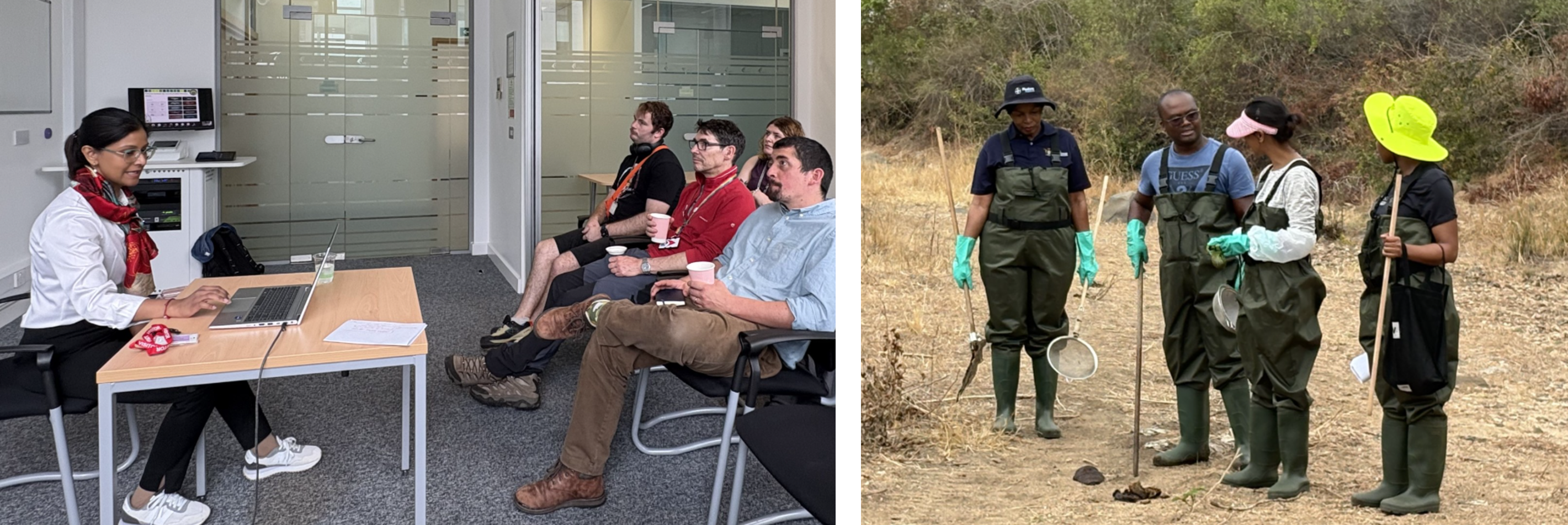
Over the past two months, a new UK-South Africa collaboration commenced, spring boarding upon the general momentum of hybrid schistosome research in Malawi. This exciting collaboration focuses on the forthcoming PhD study of Bhavani Moodley, National Institute for Communicable Diseases (NICD), Johannesburg. Bhavani has been working closely with the HUGS team honing her research skills, both in the field and in the laboratory, whilst liaising with her local supervisory team of Professor John Frean and Dr Charlotte Sriruttan-Nel, NICD.
For several years, Bhavani has been the Parasitology Laboratory Manager at the Centre for Emerging Zoonotic and Parasitic Diseases (CEZPD), which provides diagnostic specialist reference services for parasitic diseases across South Africa and for several countries in the region. Whilst conducting lab-based surveillance for schistosomiasis, she identified that zoonotic schistosomiasis needs a closer look, and her research journey has now begun with a two-week training visit to the UK, hosted here at the LSTM with the HUGS team.
Whilst in the UK, Bhavani was introduced to practical field sampling techniques at Knowsley Safari Park, helping with environmental water testing, snail surveillance and animal faecal examinations – essentials in surveillance of zoonotic schistosomiasis. Using HUGS samples, Bhavani observed and practiced essential molecular parasitological techniques using our MYRA and MIC instruments, inclusive of genomic DNA extraction from FTA cards, real-time PCR analyses with high-resolution melt profiling and DNA sequencing, all of which are useful molecular methods in the identification of hybrid schistosomes.
Bhavani also gave a very well received Tropical Disease Biology departmental seminar when she discussed her general work at NICD and some of the more fascinating parasitic diseases they have encountered over the years within this busy national reference laboratory. For example, their recent work highlighted an imported human case of tick-borne babesiosis, caused by a zoonotic protozoan Babesia microti, which mimics both the clinical presentation and blood smear microscopy of Plasmodium falciparum.
Upon return to South Africa during late September, Bhavani undertook a 3-day pilot field study in Mpumalanga Province. Here her team was joined by Professor Russell Stothard who provided direct support in medical malacological sample processing. It was a hands-on, immersive experience where every collected sample held the potential for a discovery. Once back in the field laboratory, gold was struck upon the successful retrieval of schistosome cercariae.
Indeed, this pilot study was a significant first step towards Bhavani’s PhD. These newly collected larval specimens are to be fully characterised with molecular testing at the NICD. This will confirm whether hybrid schistosomes of Schistosoma mattheei and Schistosoma haematobium are circulating within this region of South Africa. Such evidence aids better tailoring of One Health interventions that diminish hybrid transmission, so watch this space!